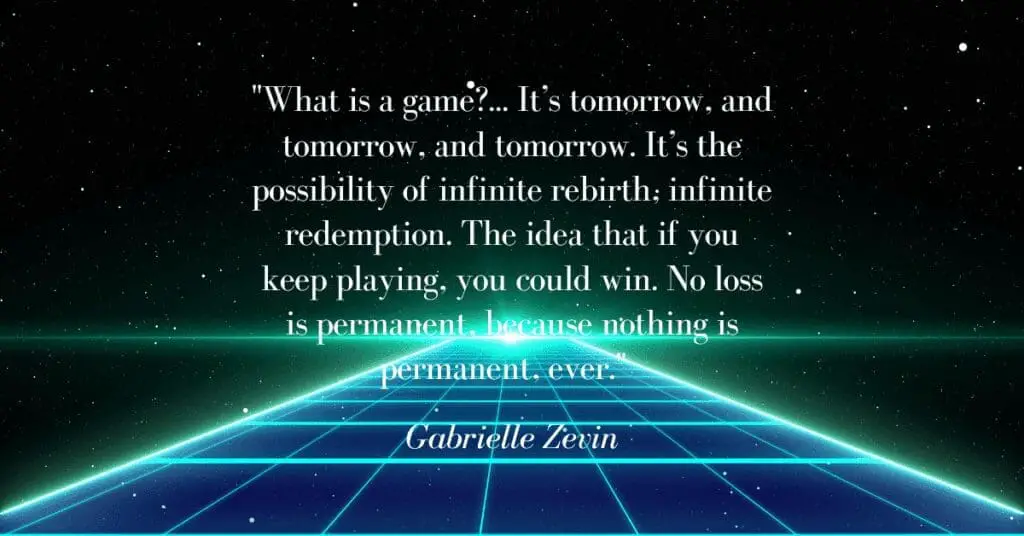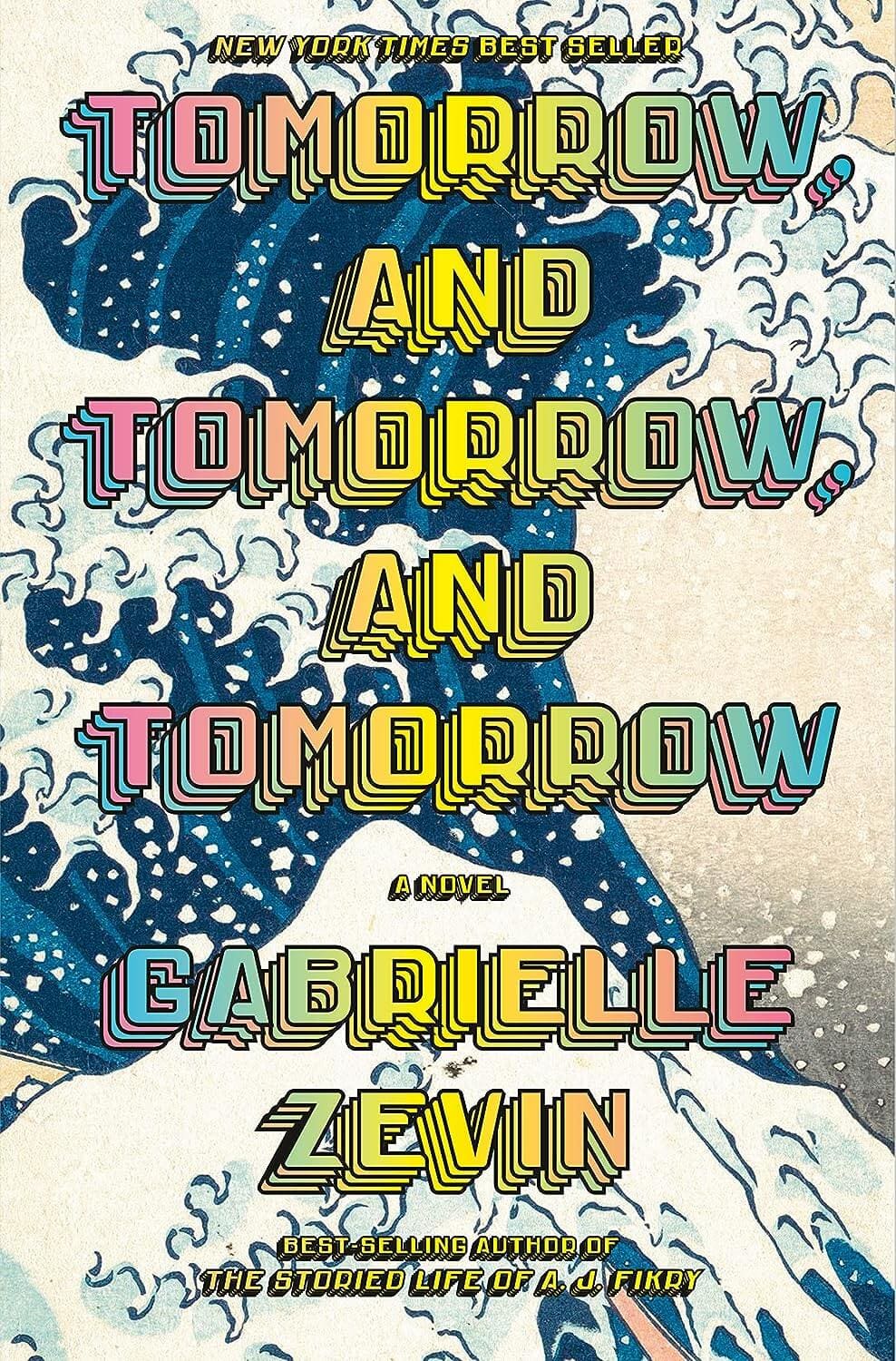1. “But people—the ordinary, the decent and basically honest—couldn’t get through the day without that one indispensable bit of programming that allowed you to say one thing and mean, feel, even do, another.” pg. 4
2. “Time was mathematically explicable; it was the heart—the part of the brain represented by the heart—that was the mystery.” pg. 5
3. “This is what time travel is. It’s looking at a person, and seeing them in the present and the past, concurrently. And that mode of transport only worked with those one had known a significant time.” pg. 8
4. “You’re incredibly gifted, Sam. But it is worth noting that to be good at something is not quite the same as loving it.” pg. 11
5. “To allow yourself to play with another person is no small risk. It means allowing yourself to be open, to be exposed, to be hurt. It is the human equivalent of the dog rolling on its back—I know you won’t hurt me, even though you can. It is the dog putting its mouth around your hand and never biting down. To play requires trust and love.” pg. 21
6. “This life is filled with inescapable moral compromises. We should do what we can to avoid the easy ones.” pg. 23
7. “There are people like you and like me. We have bad things happen to us, and we survive them. We are sturdy. But with people like your friend, you must be exceptionally gentle, or they may break.” pg. 41
8. “Promise me, we won’t ever do this again,” Sadie said. “Promise me, that no matter what happens, no matter what dumb thing we supposedly perpetrate on each other, we won’t ever go six years without talking to each other. Promise me you’ll always forgive me, and I promise I’ll always forgive you.” These, of course, are the kinds of vows young people feel comfortable making when they have no idea what life has in store for them.” pg. 58
9. “…he had learned to tolerate the sometimes-painful present by living in the future.” pg. 65
10. “There is a time for any fledgling artist where one’s taste exceeds one’s abilities. The only way to get through this period is to make things anyway.” pg. 68
11. “It wasn’t so much being on stage that he loved, but the productions themselves. He loved the intimacy of being in a tight group of people who had come together, miraculously, for a brief period in time, for the purpose of making art. He mourned every time a production was over, and he rejoiced when he was cast in a new one.” pg. 73
12. “Beauty, after all, is almost always a matter of angles and resolve.” pg. 78
13. “And yet, somewhere deep inside himself, he felt a recognition and then a reckoning: this was death, and he would die, and his mother would die, and everyone you ever met and ever loved would die, and maybe it would happen when you or they were old, but maybe not. To know this was unbearable: it was a fact too large for a nine-year-old avatar to contain.” pg. 108
14. “To return to the city of one’s birth always felt like retreat.” pg. 146
15. “Sam’s doctor said to him, “The good news is that the pain is in your head.” But I am in my head, Sam thought.” pg. 190
16. “I get it, though. ‘Wouldn’t It Be Nice’ is definitely more upbeat,” Sadie said. “You sort of want to kill yourself when you hear ‘God Only Knows.’ ” “That’s my favorite kind of music,” Abe said. “I call it afternoon music. You don’t want to listen to it too early in the day, or the day’ll be lost to you.” pg. 191
17. “She had thought she arrived. But life was always arriving. There was always another gate to pass through. (Until, of course, there wasn’t.)” pg. 228
18. “The most successful people are also the most able to change their mindsets.” pg. 247
19. “Sam used to say that Marx was the most fortunate person he had ever met—he was lucky with lovers, in business, in looks, in life. But the longer Sadie knew Marx, the more she thought Sam hadn’t truly understood the nature of Marx’s good fortune. Marx was fortunate because he saw everything as if it were a fortuitous bounty.” pg. 266
20. “The way to turn an ex-lover into a friend is to never stop loving them, to know that when one phase of a relationship ends it can transform into something else. It is to acknowledge that love is both a constant and a variable at the same time.” pg. 301

21. “What is a game?” Marx said. “It’s tomorrow, and tomorrow, and tomorrow. It’s the possibility of infinite rebirth, infinite redemption. The idea that if you keep playing, you could win. No loss is permanent, because nothing is permanent, ever.” pg. 336
22. “It begins to seem to me that life is little more than a series of losses, and as you must know by now, I hate losing.” pg. 352
23. “And what is love, in the end?” Alabaster said. “Except the irrational desire to put evolutionary competitiveness aside in order to ease someone else’s journey through life?” pg. 355
24. “If you’re always aiming for perfection, you won’t make anything at all.” pg. 376
25. “…art doesn’t typically get made by happy people.” pg. 378
26. “Maybe it was the willingness to play that hinted at a tender, eternally newborn part in all humans. Maybe it was the willingness to play that kept one from despair.” pg. 387
27. “it was a kind of immaturity to call yourself old before you were.” pg. 396
28. “There’s no point in making something if you don’t think it could be great.” pg. 396

Related Posts:
I’ve never been much of a gamer, but there’s something magical about the nostalgic charm of Super Mario Bros. I fondly remember those scorching hot summers in the south, seeking refuge indoors as I embarked on epic adventures battling Goombas and attempting to soar over flagpoles.
With each level I conquered, time seemed to melt away, transporting me to a colorful cartoon realm. Much like getting lost in the pages of a good book, Super Mario Bros. provided a soothing escape, where I could explore every nook and cranny the game realm, discovering hidden cloud lands in my quest to rescue the princess.
It was in those moments, controller in hand, that the lines between reality and the pixelated universe blurred, and a whole new world of imagination opened up before me.
It’s this world that Gabrielle Zevin so beautifully explores in Tomorrow and Tomorrow and Tomorrow. The novel presents an immersive, thought-provoking journey where the boundaries between the virtual and the real blur, and where love, loss, and self-discovery unfold in extraordinary, at times painful, yet unexpected ways.
